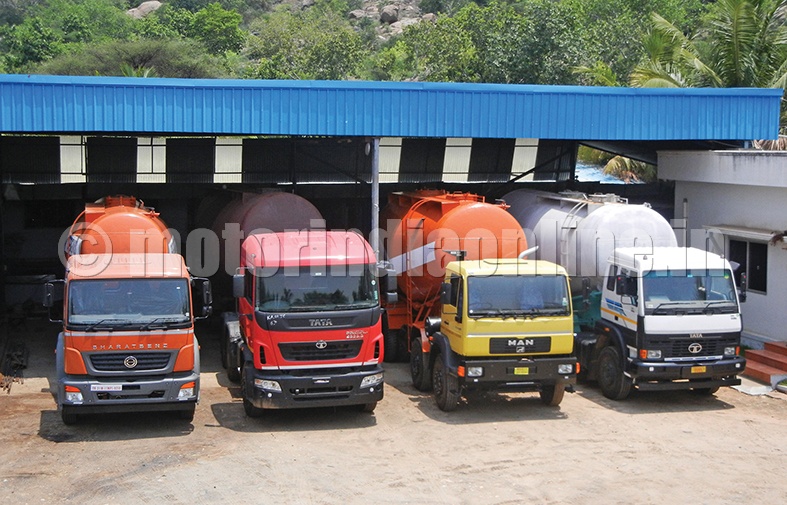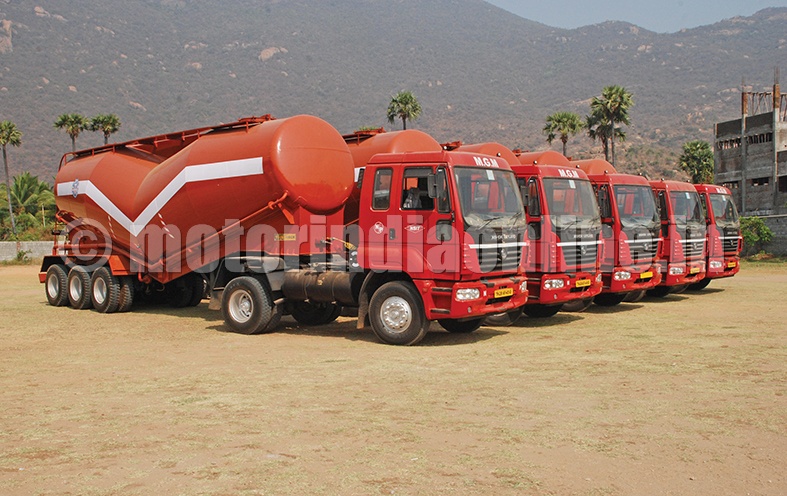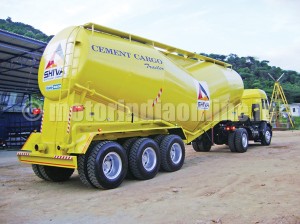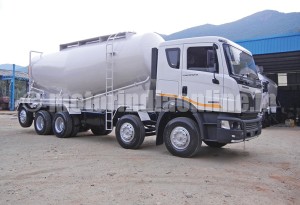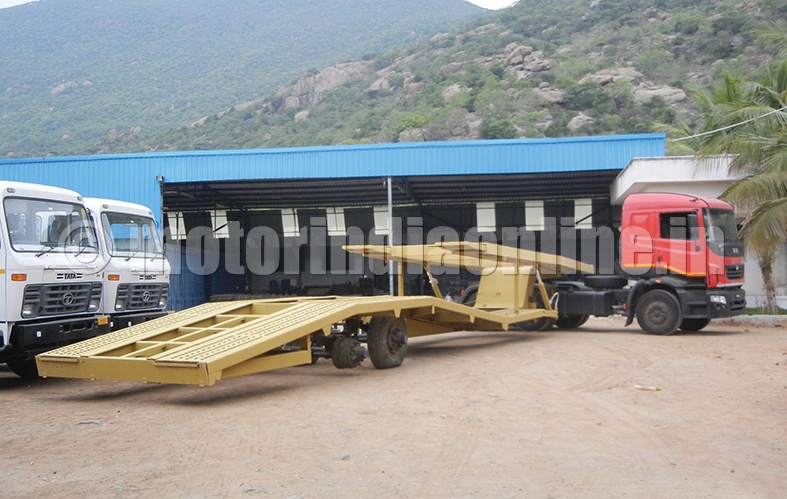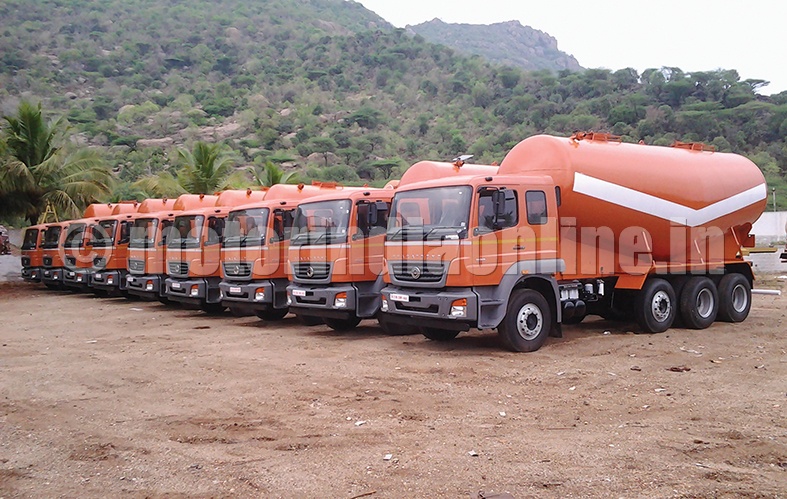Leveraging stringent production norms, quality standards and prompt delivery to stay ahead
The onset of monsoon has always that magical effect of enhancing the beauty of nature all around; and that characteristic intermittent rains during the period cleanses the vegetation to present a riot of colours against a refreshing verdant backdrop. The charming effect gets only accentuated while travelling on the cool country side roads abutting the mountainous terrain and one such trip was to the factory to Tamilnadu Machine Works (Tan Mach), Mettur Dam, Salem (Dt.), Tamil Nadu, a pioneering manufacturer of fly ash and cement bulkers in south India.
As we approach the Mettur Thermal power station on Bhavani road, the sight of bulkers plying on the road becomes a common sight; also witnessed are several small timers on the roadside workshops involved in fabrication of bulkers/trailers and the same gives a sense of the prevailing industry demands, local skill sets and competition thereof in the domain. Tan Mach is located in the thick of these actions but on a on a secluded picturesque workspot against the background of a lush green hillock, a functioning granite quarry belonging to the State Govt. The factory is lined up with bulkers in varied stages of production, an impressive sight that marks the vibrancy of the unit.

We catch up with Mr. M. Senthil Velu, Proprietor at the works office in serious discussions with customers negotiating for an order. He excuses himself for the unscheduled customer meeting and after seeing them off settles down to share his life journey as an entrepreneur and establishing the company as one of the preferred suppliers of the region in a competitive space.
Initial years
Mr. Senthil after finishing technical education joined his father running an auto electric workshop in Mettur during early nineties to assist him and expand the business. Mettur thermal station greenfield project work had just commenced and he approached the contractors executing site fabrication and erection for job orders. Contractors invariably had sundry fabrication and machining works to be carried out and this gave him an ideal platform to prove his credentials.
Mr. Senthil says: “I took up the small orders and supplied the finished parts as per the drawings and specs on time; the promptness in delivery, a trait which has stuck on with me since then, resulted in more orders coming my way and soon I was executing major orders for structural works and miscellaneous conveyor equipment fabrications at site.”
“After that project got completed I took up similar assignments from Tamil Nadu Newsprint and Papers Ltd., Karur, and later on with Indian Oil Corporation Ltd., Coimbatore, region executing their underground fuel storage tank work at various locations in their petrol bunk modernisation program. Mettur thermal power station by that time was operating in full steam ahead and the effective and economical disposal of fly ash posed serious challenges. The bulkers were just then getting deployed to transport fly ash to the cement manufacturing units near Coimbatore; and these bulkers at that time were supplied by a few firms in western India. There were no bulker manufacturers in south and the timely service for these bulkers always posed great problems for the transport contractors. My experience came in handy and I started attending to the service related issues; and the satisfied contractors brought in more work.”
“Exposure to diverse complex and demanding field problems gave the necessary insights into the bulker business and the confidence to start manufacturing the equipment. Tan Mach, first of its type in the region during the initial stages focussed on attending to sundry services and retrofitting work; and with the experience gained, eventually started producing the complete bulker unit. The first bulker was supplied to a leading logistics contractor of the region and there has been no looking back since then.”
Bulkers program
Tan Mach is an SSI unit located on a 3 acre plot and has built up area of 20,000 sq.ft. It employs 50 workers both as employees and on contract. Critical plant and machinery for general and specialised fabrication and machining works like the plate bending, rolling, shearing, punching and cutting machines, full-fledged machine shop, CO2 welding units, pressure testing and painting facilities, mobile and gantry cranes for materials handling, etc., are available to meet their needs. Also due to the power problems in the region, they have a backup generator to fully support all the normal operations.
“I get most of my bulker fabrication and machining done in-house. This enables me to follow correct manufacturing procedures so critical for an equipment like bulker – take for example the support web sections of the tank wherein the plates are bent to provide better welding and support areas for the necessary rigidity and strength,” he summarises.
What about the bough-out materials and components? Mr. Senthil responds: “These days we use high strength steel Domex for fabrication though it’s imported, more expensive compared to MS and not readily available off the shelf. The days of overloading are coming to an end with the various State Govt. agencies implementing the load regulations with severe penalties for violations. Our bulkers run all over India from West Bengal to HP, Rajasthan apart from places in both south and west India. In such a scenario, we need to use lightweight high strength materials to maximise the payload. We plan for the requirements well in advance, procure the material in bulk and stock it up for ensuring shorter delivery periods. We get axle assemblies of reputed makes like York, Fuwa and BPW. Tan Mach introduced Fuwa in the region and now we are introducing BPW make of Germany. The BPW team was recently here assisting us in the initial installations as the same is a new introduction to the Indian markets.”
“The dished ends done through hydraulic press are procured from outside and I have trained the workers at all stages to independently take care of the fabrication, welding or assembly work. The trailer wheel alignment is done by us to the highest precision standards and we take extraordinary care to ensure that the bulkers which go out are fully tested and complete in all aspects. This has been one of the main reasons for Tan Mach bulkers being sought after in the market despite the presence of many companies selling these at much lower prices.”
As regards the range, Mr. Senthil indicates that in view of the correct weight bulkers becoming the norm, the customers also have understood the need to meet the regulation and do not insist for oversize equipment. In line with the same, he adds that in the bulker on rigid chassis 2516 10 wheel, 3118 12 wheel and 3718 14 wheel, tank capacities 16 cu.mtr., 20 cu.mtr. & 25 cu.mtr. respectively are popular. In the bulker trailer configuration of 3518 14 wheel, 4023 18 wheel and 4923 22 wheel, popular tank capacities include 24 cu.mtr., 27 cu.mtr. and 32 cu.mtr. respectively. The company can produce about 20 bulkers a month and the same supplied for carrying fly ash, cement and slag.
Mr. Senthil states: “In our bulkers, the entire material can be unloaded at customer site; and this aspect enables us score over several competitors in whose bulkers the unloaded material ranges from 0.5 ton to 5 ton, the same creating various technical and commercial issues for the transporter. We are also getting enquires for transport of Atta and other food grains in powder form. In such a case, we will be offering special grade materials compatible with payload for the transport.”
How does Tan Mach address marketing, service and supplies to OEMs? Mr. Senthil replies: “You must have seen on the way various skilled workers by the side of the road repairing/fabricating bulkers in their small workshops and open yard; well the competition starts from that level to the big companies with overseas association and Tan Mach has to sell against all of them. We do not have a structured marketing set-up and I take care of the same almost as a single person. On the service front we have a team that can attend to customer’s problems within a short time depending on the location.”
“Yes, the product performance is the key reason for so many bulkers lined up at our place. In this field, the end users are our best ambassadors for generating repeat/new orders and as the bulker operators have a close network, anything good or bad about the product spreads fast. One cannot sustain in this market only based on price. As regards supplies to OEMs, we have received couple of calls from leading OEMs to manufacture bulkers exclusively for them at their factories. Tan Mach is currently supplying bulkers on all chassis makes and we want to continue doing it in the same way rather than getting wedded exclusively to one OEM.”
Road ahead
Currently about 40% of the cement handling occurs thro’ the bulker route while the rest via cement bags and this ratio should change significantly in future; expect bulker route to rise up to about 85% and this means a good scope for bulkers in the near future, opines Mr. Senthil.
Commenting on the State of bulker business, he says on an optimistic note: “For the last 2 to 3 yrs., the segment has been in depressed state due to the stagnation in projects and infrastructure activities leading to lower demand for bulkers. With the economy starting to look up and the likely infrastructure spending, the scenario is expected to change and I see the segment doing well down the timeline. With shorter delivery periods, prompt supplies and quality bulkers, we are confident of staying ahead of the competition and retaining our standing in the market as one of the preferred bulker suppliers.”
Despite the likely growth in the bulkers, he is aware that it’s only a matter of time before the competitors will catch up with them and hence always on the lookout for adding new products to stay one step ahead. Apart from expanding in bulker domain with products like tipping silo/bulker trailer and bulkers for chemical and other food grain in powder form, Tan Mach has also added some special purpose carrier vehicles to its portfolio. Truck/chassis/bus carrier and special trailers are in line with this approach. Tan Mach also has drawn out plans to enter into waste management and related segments to meet wider markets.
As often said, seeing is believing and in having done that and intensively listening the synergic plans for expansion, we cannot but agree more that Tan Mach should be able to achieve its goals within a short period; and the company graduate to the next level in their supply program of general and special purpose carrier vehicles for the logistics sector.
